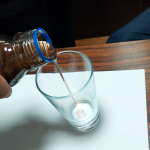Calcium chloride (CaCl2) is an inorganic compound composed of calcium and chlorine. It is widely used in various industries for its versatile properties.
Here is a complete overview of calcium chloride, including its applications,
types, purity percentages, and more:
1. Applications:
– Deicing and Snow Removal: Calcium chloride is commonly used as a deicing agent for roads, highways, parking lots, and sidewalks. It helps melt ice and snow by lowering the freezing point of water.
– Dust Control: It is used for dust suppression on unpaved roads, mining sites, construction areas, and agricultural fields.
– Concrete Acceleration: Calcium chloride is added to concrete to speed up the curing process, especially in cold weather conditions.
– Water Treatment: It is used to adjust the hardness of water, control pH levels, and remove impurities in swimming pools, wastewater treatment plants, and other water treatment processes.
– Food and Beverage: Calcium chloride is used as a firming agent, preservative, flavor enhancer, and source of calcium in food and beverage industries.
– Oil and Gas Industry: It is used in drilling fluids, completion fluids, and as a desiccant for moisture control in gas and oil production.
– Chemical Industry: Calcium chloride is used in various chemical processes, such as drying agents, catalysts, and in the production of calcium salts.
– Pharmaceuticals: It finds applications in the pharmaceutical industry as an excipient, electrolyte replenisher, and in certain medical treatments.
– Agriculture: Calcium chloride is used for soil conditioning, as a source of calcium for plants, and to control excess moisture.
Calcium chloride (CaCl2)
2. Types of Calcium Chloride:
– Anhydrous Calcium Chloride: It is the most common form of calcium chloride and is available as a white, crystalline solid. Anhydrous calcium chloride has a higher concentration of calcium chloride and is typically used for industrial purposes.
– Dihydrate Calcium Chloride: This type contains two molecules of water per molecule of calcium chloride. It is commonly used in commercial and consumer applications, such as deicing, dust control, and food additives.
– Hexahydrate Calcium Chloride: It contains six molecules of water per molecule of calcium chloride. Hexahydrate calcium chloride is commonly used for deicing, dust control, and industrial applications.
3. Purity Percentages:
The purity of calcium chloride can vary depending on the manufacturing process and intended application. Common purity percentages include:
– Industrial Grade: Typically, industrial-grade calcium chloride has a purity level of around 95-98%.
– Food Grade: Calcium chloride used in the food industry is required to meet specific purity standards, typically with a purity level of 99% or higher.
– Pharmaceutical Grade: Pharmaceutical-grade calcium chloride is produced under strict quality control and purification processes to ensure high purity levels of 99% or greater.
- Other Properties:
– Molecular Weight: 110.98 g/mol
– Melting Point: Anhydrous: 772°C (1422°F), Dihydrate: 176°C (349°F), Hexahydrate: 30°C (86°F)
– Boiling Point: Anhydrous: 1935°C (3515°F), Dihydrate: Decomposes upon heating
– Density: Anhydrous: 2.15 g/cm³, Dihydrate: 1.85 g/cm³, Hexahydrate: 1.71 g/cm³
– Solubility: Highly soluble in water, soluble in alcohol Note: It is essential to follow appropriate handling and storage guidelines for calcium chloride, as it can cause skin and eye irritations and can be hazardous if ingested or inhaled.




